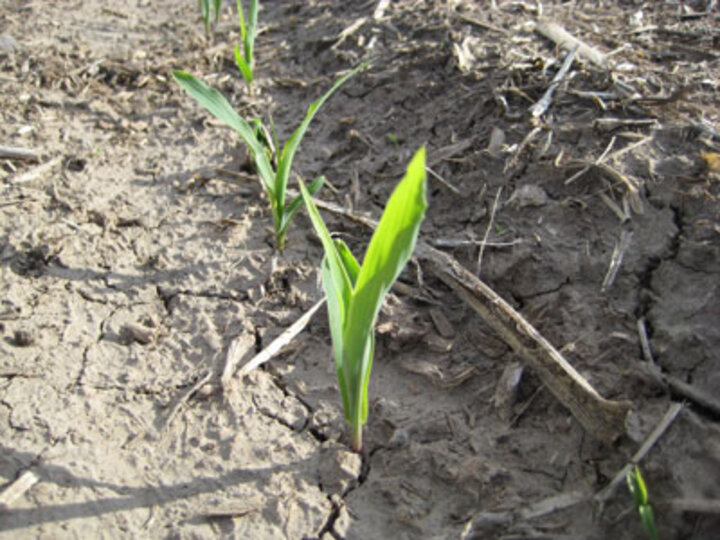
The cool weather and wet soil conditions in south central and eastern Nebraska have disrupted the normal sequence of early season field operations such as pre-emergence herbicide application. This year many Nebraska corn fields were planted, but due to wet soil conditions, pre-emergence herbicides were not applied. We have received phone calls from corn growers about options for applying soil residual, pre-emergence herbicides after corn emergence.
Application of soil residual herbicides is important because usually they deliver several weeks of weed control, cover a broad spectrum of weeds, and aid in weed resistance management by incorporating additional site(s) of action. Several residual, pre-emergence herbicides such as Breakfree, Dual II Magnum, Harness, Keystone, Prowl H2O, Warrant, Zidua can be applied after corn emergence without injury to corn.
These products do not have foliar activity and will not control weeds present at application. Therefore, they should be tank-mixed with foliar herbicides labeled for corn. Some of the herbicides, including Anthem ATZ, Bicep II Magnum, Breakfree ATZ Lite, Confidence Xtra, Degree Xtra, FulTime NXT, Keystone LA NXT, Lumax EZ / Lexar EZ, Stalwart Xtra, and Volley ATZ NXT contain active ingredients (such as atrazine) that have foliar activity. When applied at the correct weed growth stage, they will provide burndown activity (Table 1). Growers should consult product labels for additional information, such as the need for tank-mix partners or spray additives to improve control of existing weeds. For example, the post-emergence activity of atrazine can be increased by including an oil additive, yet additives should not be used if applying Balance Flexx or Corvus after corn emergence.
| Table 1. Corn growth stage and maximum weed stage when pre-emergence herbicides can be applied post-emergence. | ||
| Herbicide | Corn Stage | Maximum Weed Stage |
| Aatrex / Atrazine | 0-12" | 1.5" |
| Anthem / Anthem ATZ | V4 | 2" |
| Balance Flexx1 | V2 | 1.5" |
| Bicep II Magnum / Cinch ATZ | 0-12" | 2-leaf |
| Bicep II Lite Magnum / Cinch ATZ Lite | 0-12" | 2-leaf |
| Bicep II Magnum | 0-12" | 2-leaf |
| Breakfree | 0-11" | unemerged |
| Breakfree ATZ | 0-11" | unemerged |
| Breakfree ATZ Lite | 0-11" | unemerged |
| Callisto2 | 0-30" | 5" |
| Corvus1 | V2 | 1.5" |
| Degree | 0-11" | unemerged |
| Degree Xtra | 0-11" | 2-leaf |
| Dual Magnum | 0-5" | unemerged |
| Dual II Magnum / Cinch | 0-40" | unemerged |
| Dual II Magnum + Aatrex | 0-12" | 2-leaf |
| Expert | 0-12" | 6" |
| FulTime NXT | 0-11" | unemerged |
| G-MAX Lite | 0-12" | 1.5" |
| Guardsman Max | 0-12" | 1.5" |
| Harness / Confidence | 0-11" | unemerged |
| Harness Xtra / Confidence Xtra | 0-11" | 2-leaf |
| Hornet WDG | 0-20" | 8" |
| Instigate | V2 | 3" |
| Keystone | 0-11" | unemerged |
| Keystone LA NXT | 0-11" | unemerged |
| Lightning (IMI Corn) | corn | weeds |
| Lumax EZ / Lexar EZ | 0-12" | 3" |
| Outlook | 0-12" | unemerged |
| Prowl H2O | 0-30" | 1" |
| Python | 0-20" | 6" |
| Resolve | 0-12" | 3" |
| Surpass NXT | 0-11" | unemerged |
| Stalwart C | 0-40" | 2-leaf |
| Stalwart Xtra | 0-5" | 2-leaf |
| SureStart / TripleFLEX | 0-11" | 2" broadleaves |
| TopNotch | 0-11" | unemerged |
| Warrant | 0-30" | unemerged |
| Zemax | 30" or V8 | 5" |
| Zidua | V4 | unemerged |
|
1 If Balance Flexx or Corvus is applied after corn emergence, do not add crop oil concentrate. |
||
Attempting to save a trip across the field by applying an herbicide with a liquid nitrogen fertilizer solution, such as 28% urea ammonium nitrate (UAN), as the carrier is not advisable if corn has emerged. (See CropWatch article.) Tank-mix partners may cause other effects regardless of the application timing. Follow application timing and other restrictions of tank-mix herbicide partners as noted in the herbicide label.
Several important factors should be considered when addressing weed control with residual herbicides applied after corn emergence:
- crop stage,
- weed height, and
- tank mix partner.
Table 1 has more specific information for residual herbicides that can be applied after corn emergence with regard to corn stage and weed height. (Source: Page 160, 2014 Guide for Weed Management with Insecticide and Fungicide Information)
Glyphosate-resistant marestail, giant ragweed, common waterhemp, and kochia have been confirmed in Nebraska. Control of these glyphosate-resistant weeds is a major challenge for Nebraska corn and soybean producers. Residual herbicides have been reported to be an effective tool for controlling herbicide-resistant weeds.
Length and effectiveness of residual activity from in-crop herbicide application will vary depending on
- weed species,
- application rate,
- rainfall following application (minimum of 0.5 inch within a week of application is ideal to activate residual herbicide),
- density of the weed and crop canopy at the time of application, and
- length of subsequent weed germination events.
For more information, see 2014 Guide for Weed Management in Nebraska (EC 130) published by the University of Nebraska-Lincoln Extension. Always read herbicide labels before applying in the field.
Amit Jhala, Extension Weed Management Specialist
Lowell Sandell, Weed Science Extension Educator
5/15/14
